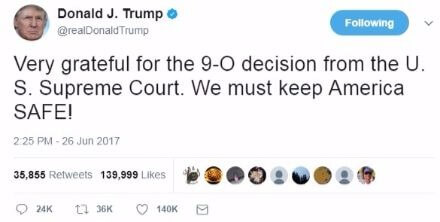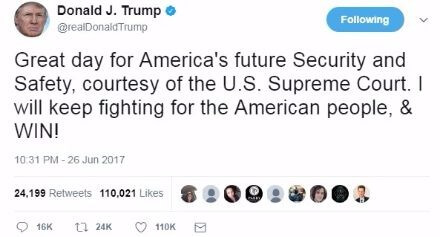Introduction
On June 26, 2017, the Supreme Court issued a decision in Trump v. International Refugee Assistance Project, 582 U.S. ___ (2017) [PDF version]. The decision concerned the so-called “travel ban” included in President Trump’s March 6, 2017 Executive Order 13780 titled “Protecting the Nation From Foreign Terrorist Entry Into the United States” [PDF version]. In short, the Court agreed to hear the challenge to the Executive Order during the court’s next term (likely in October), but it also narrowed significantly the lower court injunctions against the Executive Order’s suspension of entry of nationals of six countries [see article] and the suspension of refugee travel [see article].
To understand the Supreme Court’s reasoning and the effect of its first decision in Trump v. International Refugee Assistance Project, please see our full article [see article]. Our full article explains how the injunction against sections 3(c) and 6(a) and (b) of the Executive Order were narrowed. In this article, we will examine the early responses to the ruling from the Trump Administration for clues on what may be the next steps regarding the implementation and enforcement of the non-enjoined provisions of the Executive Order.
Department of State Response
[PDF version] of statement.
Department of State (DOS) spokeswoman Heather Nauert responded to the decision on behalf of DOS. She stated that the DOS would move to implement Executive Order 13780 “in an orderly fashion, consistent with the Supreme Court’s unanimous order, and in accordance with the Presidential Memorandum issued on June 14, 2017, which directs us to begin implementation 72 hours after the stay.” Please see our full article to learn more about the Presidential Memorandum [see article]. Notably, the DOS is interpreting the Supreme Court decision as lifting the injunction such that the previously enjoined sections of President Trump’s Memorandum will now take effect within 72 hours of the court’s decision. This means the DOS should be enforcing Executive Order 13780 to the extent permitted by the Supreme Court by June 29.
The DOS statement explains that it will provide additional details after consulting with the Departments of Justice and Homeland Security.
The DOS added that it will keep stakeholders posted with regard to further developments in the implementation of Executive Order 13780.
Department of Homeland Security Response
[PDF version] of statement.
The Department of Homeland Security (DHS) began by explaining that the Supreme Court’s decision allows it “to largely implement the President’s Executive Order and take rational and necessary steps to protect our nation from persons looking to enter and potentially do harm.” The DHS praised the decision as “restor[ing] to the Executive Branch crucial and long-held constitutional authority to defend our national borders.”
The DHS stated that it will provide more details on its implementation of Executive Order 13780 after consulting with the Departments of Justice and State. It pledged that the implementation of the Executive Order would be done professionally, with clear and sufficient notice, and in coordination with partners in the travel industry.
Department of Justice Response
[PDF version] of statement.
The Department of Justice (DOJ) published a statement from United States Attorney General Jeff Sessions regarding the decision. Note that the DOJ is tasked with defending the Executive Order before the Supreme Court.
The Attorney General stated that he was pleased that the Supreme Court agreed to hear the case and that the DOJ looks forward to arguing it.
Citing to a spate of recent terrorist plots and attacks by groups such as ISIS and al Qaeda, Attorney General Sessions stated that “[i]t is crucial that we properly vet those seeking to come from [war-torn and failed countries], and failing to do so puts us all in danger.”
Attorney General Sessions stated that the Court’s ruling is “an important step towards restoring the separation of powers between the branches of the federal government.” The Attorney General stated that the decision recognizes the Executive’s responsibility for national security under the Constitution and other U.S. laws. He added that the judiciary too serves under the same Constitution and laws, and that the DOJ looks forward to answering questions about the proper balance of these constitutional powers as the proceedings move forward.
Attorney General Sessions concluded:
Through Article II of the Constitution, the founders of our country vested the Executive Branch with a great responsibility: to ensure the national security of our country. I am committed to defending the President’s ability to exercise that responsibility and the Department of Justice is confident that the United States Supreme Court will uphold this constitutional and necessary executive order.
Response from President Donald Trump
[PDF version] of statement.
The White House Office of the Press Secretary issued an official statement from President Trump.
President Trump described the “unanimous Supreme Court decision” as “a clear victory for our national security.” He noted that it allows the suspension of entry and suspension of refugee travel provisions “to become largely effective.”
President Trump stated that he cannot allow people into the United States “who want to do us harm,” but that he “want[s] people who can love the United States and all of its citizens, and who will be hardworking and productive.”
President Trump stated that his “number one responsibility” is to keep the American people safe. He added that the ruling gives him an important tool to protect the United States. Furthermore, he expressed satisfaction that the decision to narrow the injunction had no dissenters on the Supreme Court.
Not content to leave it at the official statement, the President would add two Tweets on the ruling later in the day. We have reproduced his Tweets for your convenience:


Conclusion
The White House, DOS, DHS, and DOJ each expressed satisfaction with the decision. In the coming days, the DOS, DHS, and DOJ will work together to determine how to implement the Executive Order in a manner consistent with the Supreme Court decision in Trump v. International Refugee Assistance Project. Significantly, the DOS and DHS promise to keep the public abreast of its plans, hopefully averting the confusion that accompanied the initial January 27, 2017 Executive Order. We will update the website with information about the implementation of Executive Order 13780 and about the continuing litigation before the Supreme Court as it becomes available.





